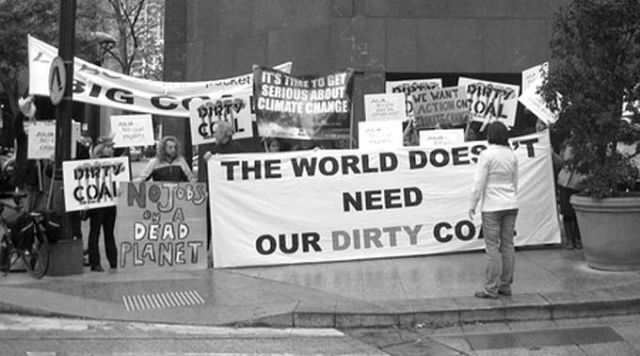
In her opening remarks as Australia’s new prime minister, Julia Gillard said she believed climate change was real and was caused by human activity. What she left unsaid was that she doesn’t believe in doing much to stop it.
Former PM Kevin Rudd’s rapid nosedive in the opinion polls coincided with Labor’s April decision to dump its proposed emissions trading scheme until 2013.
The scheme itself was radically flawed, but many people still associated it with action on climate change. More than with any other issue, Labor was punished for its perceived backflip on climate.
But don’t imagine the government has learned anything from the experience. Gillard’s rise does not signify a new direction for Labor on climate change. Her new climate spin is the same as the old spin.
The very first act of the Gillard government underscored that while it may believe in climate change, it also believes in boosting Australia’s coal exports — which makes climate change worse.
Within 24 hours of becoming PM, Gillard sent then-trade minister Simon Crean to Melbourne on June 25 to sign a deal to export highly polluting brown coal to Vietnam.
About 50 people attended a snap protest outside. They drew attention to the fact the Gillard government had faced its first climate test, and failed.
The Australian company involved in the deal to export the dirtiest of all fossil fuels is called Environmentally Clean Technologies — a name so brazenly dishonest it would rank with branding a military hardware manufacturer “Life-giving Industries”.
The company likes to lay its greenwash on thick. It has even used the website name
But Gillard has done nothing to prove her promises to tackle climate change are not a similar kind of greenwash. Both big parties suffer from a big credibility gap on global warming.
A recent Auspoll survey of 1000 people found more than 65% could not tell the difference between Labor and the Coalition on global warming. Just 19% said Labor had a stronger climate policy, while 15% thought the Coalition’s climate policies were better.
Among undecided voters, 80% said the climate positions of Labor and the Coalition were too close to tell apart.
The poll, which was released on June 28 by The Climate Institute, GetUp!, the Australian Council of Trade Unions and the Australian Conservation Foundation, found more than 80% of people accepted that climate change was made worse by carbon pollution. Only 9% said greenhouse gases should not be cut at all.
In recent months, the growing awareness that Labor was not prepared to act on climate change gave a boost to the Greens. Several polls showed Greens’ support at record levels.
But a June 26 Herald/Nielsen poll, conducted after Gillard took over the Labor leadership, indicated a swing back to Labor and away from the Greens.
The poll bounce makes it likely Gillard will call a federal election very soon. Labor’s gamble will be that it can now win the election, and win back disaffected voters who had switched support to the Greens, without making any major climate commitments at all.
Gillard’s statements so far back this up. She has said she supports a price on carbon to help lower emissions, but has made no commitment as to when this will be done.
She said on June 25: “I believe that if we are to have a price on carbon and do all the things necessary for our economy and our society to adjust, we need a deep and lasting community consensus about that. We don’t have it now.”
In essence, this is the same position Rudd had stuck to for months: do nothing now but promise to act sometime in the future.
And if Gillard does put an emissions trading scheme back on the table it would amount to seeking a “deep and lasting consensus” to fail the climate challenge.
Grassroots climate activists and the Greens opposed Rudd’s proposed Carbon Pollution Reduction Scheme from the outset because of its tiny emission cut targets and its huge handouts to the big polluters.
In a June 28 letter to Gillard, Greens leader Bob Brown restated the party’s previous offer to the Rudd government to pass an interim carbon tax of $23 a tonne through the parliament.
Brown was explicit that the proposal was designed “to open the way later, to emissions trading”.
The letter also called for a halt to new coal-fired power stations, a ban on native forest logging and land clearing, and a national energy efficiency target.
However, Brown also said the Greens would not insist on any emissions cut targets for Australia until a binding international climate treaty had been finalised.
The Greens’ tactic here is obvious: make an offer that is hard for Labor to knock back. But deferring Australia’s target until there is international progress is a bad concession to make. It departs from the principle that Australia should take the lead.
And given the state of international negotiations, it’s really another way of saying Australia won’t have to set any targets for a very long time — time the planet does not have.
But there are few signs Labor is willing to negotiate with the Greens at all, despite the heavy concessions. Gillard made no comment on the offer, while Labor MP Joel Fitzgibbon ridiculed it.
Fitzgibbon told the June 28 Australian that his constituents, in the coalmining seat of Hunter, NSW, would want him to reject any policy that did not “recognise that coal will have an important role to play in our economy for many years to come”.